Gerald Elias's Blog
May 31, 2023
The Day After Memorial Day
Old Franz Eisich recited their names, one by one, as he passed by their graves on his mower. Sewalls, Pikes, Johns. The Spencers. He knew all the families by heart. The names, and the dates and epitaphs, too. Except for those under slate stones so old that all the writing had worn off long before he ever got there. Or the little ones that only had the initials of the babes who died in their mother’s arms. No one would ever know who they had been, but they were almost like his friends and he felt they knew him, too. And that odd coffin-sized patch of darker green. When his mind wandered, as had been happening more often of late, Franz wondered, is there was someone underneath there, too? And if so, could whoever was hear his mower passing over it?
Franz had tended the Rockdale graveyard since he was fourteen. Yet in all his many years, he couldn’t remember such intense heat the day after Memorial Day. Still only May and so unseasonably, unreasonably hot. And no breeze, either. They still called it the Rockdale graveyard though the hamlet of Rockdale itself, which preceded the American Revolution, became a ghost town after the train stopped coming through in the ‘30s and then was swallowed up entirely by the forest until no trace of it was left except the graveyard and vanishing memories of the old folks. And soon even those would be gone.
When the county had originally hired Franz they handed him a push mower and paid him a dollar per. He thought he would only do it for one summer because they felt sorry for him, but they kept on hiring him because he was conscientious about keeping the grass trim and well-manicured all the way up to the stones. And though no one had been buried in the graveyard since 1956, the county had wanted the little cemetery surrounded by the encroaching woods to look tidy because it was visible from the road. When times became flush, the county provided him with a John Deere rider mower, and at the end they were paying him thirty-five dollars per mowing, which, at that point in his simple life, was sufficient. But after twenty-eight years the county decided that spending money to maintain the Rockdale graveyard was a frill. Nevertheless, Franz continued to tend it on his own accord. Descendants of the deceased had a right to see the graves of their ancestors properly cared for, he thought, and as the county had by that time long forgotten about the mower, it was no problem.
Because grass grows faster in a graveyard, Franz always made it a point to mow it within a few days of Memorial Day because he wanted it to look nice on the one day in the whole year that more than the curious passer-by would pay a visit. Descendants, friends, and those who simply remembered left things: flowers, little American flags, pinwheels, balloons. Even dolls and other trinkets. For as long as he could remember, the grave of little Ashton Spencer, 1846-1849, always had a bowl of plums gracing it on Memorial Day weekend, which Franz found very curious.
Since he usually mowed the lawn only one, two, or at most three days before Memorial Day, Franz didn’t need to get back to the graveyard until a week later, by which time the bouquets had wilted. He would collect them and the gifts, and because none were worth anything, threw them all out. The plums, though, were always gone by the time he returned, and he often wondered who would be so callous to steal something like that.
This past week, Franz had needed to revise his traditional schedule because of his eyes. They were going bad. His son, Eric, had arranged an appointment with a specialist in Pittsfield to do tests on Wednesday. They told him he’d have to stay out of the light for a few days after. His granddaughter, Josie, was going to drive him there, showing off with her new driver’s license, because he didn’t drive. The John Deere was the only vehicle they decided was safe enough for him to sit behind the wheel in. Not that that was much of a consolation prize. The darn thing was getting harder and harder to start, and the engine was making a heck of a racket. Franz made sure to fill the tank with gasoline because once he got it started he sure as heck wasn’t going to turn it off until it was back in his barn.
So on the day after Memorial Day, Franz circled the half-dead oak tree in the center of the Rockdale graveyard. Before ’78—or was it ’79—when the tornado blew through and lightning struck the tree, which until then had been sort of a natural sundial, casting a circulating shadow over all the graves over the course of the day. The tornado’s path had left a flattened truck stop down the road and teased the edge of the graveyard. No one had been killed, but folks at the truck stop, having barely evaded death, joked that if they had died at least the graveyard would’ve been in good shape. A few headstones had been knocked over, which Franz subsequently reset with great care, but that was the extent of the damage. The oak, which might well have been even older than the graveyard itself, had been split right down the middle, and the shadow it cast no longer kept good time. One half of it died, though it’s charred skeleton stubbornly refused to surrender to gravity. The other half acted as if nothing had happened. In the dead of winter the two halves couldn’t be told apart, but now the live half, its pale green spring foliage, tender and vulnerable, provided the graveyard’s only shade.
Franz chose that cool spot under the living half to pull the brake on his mower. The little sunlight sneaking through the leaves painted a mask of dappled light on his face. He wiped his face with his handkerchief, removing the sweat but not the shadows. He had brought a canteen of water with him, but as his labor was almost complete, he decided that he would wait to quench his thirst.
A pair of puppies bounded out of the woods, puffballs of brown-black fur with not a care in the world, chasing tails and rolling each other over. Newfoundlands. Franz had had many a dog in his day, but never a Newfie. Only mutts. Or mixed breeds, Franz thought, as they call mutts today. Smarter and healthier than purebreds, mutts are. Better companions than people.
The pups ambled around the graveyard, sniffing as they went, ending their expedition at little Ashton Spencer’s headstone, where they ravenously began to devour the bowl of plums.
Mystery solved! Franz got off the mower to move in for a closer look, his eyesight being so poor. He left the engine running, though. He wasn’t going to take any chances of not being able to restart it. The pups, intent on enjoying their snack, paid him no heed as he approached. If only the folks who had brought the plums knew where their devotional gift was going! Should he tell them?
He was right behind the pups now, and bent over to gently shush them away.
He squinted. They weren’t puppies. They weren’t dogs at all.
Suddenly enshrouded by an unlikely shadow, Franz looked over his shoulder. An explosive blow to his forehead drove Franz to the ground. He was dazed and his head throbbed. His cheek pressing against the cool and moist dark patch of green he had just mown, Franz felt his hot blood begin to drip around his ears and mix with fresh, sweet-smelling grass clippings. He groaned and agonizingly rolled onto his back.
A mother bear, standing on its hind legs, was over six feet tall, her shadow enveloping Franz. He had seen bears before. Black bears. There had been more and more sightings of them recently—even reports of them breaking into houses and rifling through refrigerators—but no one had ever been attacked by one. At least to his knowledge.
A painful glow from the setting sun, stinging his failing eyes, formed a pulsating, read halo around the bear. What was it they say you’re supposed to do if you’re confronted by a bear? Franz tried to remember. Stand up tall and make yourself look big, or roll into a fetal ball and play dead? Be silent, or yell in a high voice? Slowly back away, or run like heck? One thing he was sure of. Never get between a mother and its cubs.
His friend Joe always carried a long stick with him just in case, to hold over his head to make himself look taller because he said bears have bad eyesight. A funny thought popped into Franz’s head that the bear should go with him to the specialist in Pittsfield.
If he could make it to the John Deere, maybe he could escape. Thank God he had left it running. Franz propped himself up on his elbows.
“Mama,” Franz said. “I mean you and your pups no harm.”
The bear hovered over him.
“You hear? This ain’t my time. I still got work to do.”
The bear carried the stench of carrion and made Franz want to vomit. The two cubs, having finished their plums, approached Franz warily. Deciding he was a new adventure, they pounced on his stiffening legs and tore on the cuffs of his overalls. Franz, dizzy, remained motionless, eyes fixed on the mother, willing it to understand. The bear raised its forearm and extended its clawed paw.
No one in memory had been killed by a black bear.
The cubs continued to tug playfully on Franz’s pant leg. As his mind hovered on the edge of consciousness, memories of his German mother long ago resurfaced. He hadn’t thought about her for such a long time.
A slight breeze rustled the leaves of the old, lightning-blasted oak and stirred the little flags and pinwheels on the graves.
The gentle tone of the bear’s voice surprised Franz.
* “ Gib deine Hand, du schön und zart Gebild!
Bin Freund, und komme nicht, zu strafen.
What did it mean? Franz wondered. It sounded like an epitaph.
** “Sei gutes Muts! ich bin nicht wild,
Sollst sanft in meinen Armen schlafen!”
Soon, the only sound in the Rockdale graveyard was the John Deere engine, and when the fuel was all spent, that, too, went silent, and the grass grew over the gravestones.
The End
*Give me your hand, you beautiful and tender form!
I am a friend, and come not to punish.
**Be of good cheer! I am not fierce,
Softly shall you sleep in my arms!”
[Death & the Maiden, by Matthias Claudius]
You can find “The Day After Memorial Day” along with 29 other intriguing stories in my collection of short fiction, IT’S A CRIME!

March 1, 2023
Spring for Mystery
“Have I Got a Deal for YOU!”
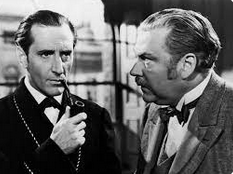
“What can you possibly mean by that, Holmes?”
“It’s elementary, my dear Watson.”
After a long, dreary winter, everyone is ready for spring. More than ready! We spent a month at our cottage in the woods in the Berkshires, where one day registered a chilly -15°F! Now we’re back in Seattle, sipping coffee, where it’s a not-so-balmy 43°, but at least there are buds on the trees.
But, as they say, hope springs eternal, or, maybe it should be, hope for spring is eternal. Either way, let’s get things rolling in the right direction.
For the entire month of March, Level Best Books is offering a huge discount on the eBook version of every one of my mysteries they’ve published.
(GIVEAWAY ALERT! At the end of this newsletter, take the 1-Question Quiz and you can be one of five winners of a free eBook of your choice!)
Take your pick of any or all of these eBooks, for only $1.99 each!

(A satisfied customer)
From the critically acclaimed Daniel Jacobus Series that takes place in the dark corners of the classical music world:
Devil’s Trill – “Will delight music lovers and mystery fans alike.”
Danse Macabre – “This book should not be missed!”
Death and the Maiden – “Fast paced and punchily written.”
Death and Transfiguration – “Brilliant and captivating on every level.”
Cloudy With a Chance of Murder – “A vibrant cast of characters and Jacobus’s indomitable wit.”
Murder at the Royal Albert – “A near perfect mystery.”
And from my pair of page-turning standalones:
The Beethoven Sequence – “A riveting mystery.”
Roundtree Days: A Jefferson Dance Western Mystery – “Exceptional” and “Hilarious.”
And That’s Not All!
My self-published collection of 30 gripping short mysteries, It’s a Crime! recently hit the market. For the month of March this collection – over 400 pages of tantalizing short mysteries – is on sale for an irresistible $2.99.
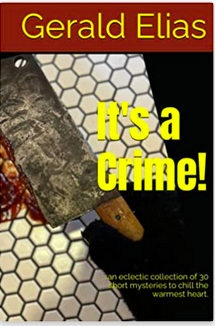
Check out this review of It’s a Crime! via all the way from the U.K.:
“I enjoyed every story in this collection, and I cannot tell you how rare that is! Delightful offerings from a superb writer – I cannot wait to start reading the novels about the characters in the short stories. My favorite is the bass player’s tale, told over coffee and crullers.”
As you’ve surmised, 2023 has gotten off to a busy start. Here’s a look at what’s happened so far and what’s coming up, with some fun events that you can participate in!
January 1: The New Year got off to a blazing start with the release of Murder at the Royal Albert , which has been attracting great reviews from noted authors and contented readers like bears to honey. Here, in its entirety, is a review a mystery writer would die for (figuratively):
“Gerald Elias has given us, his enthralled readers, friends who have developed deeply and become a part of our lives. Daniel and Yumi and their great friends invite us into their world of great music, food, travel and compassion as they solve yet another brilliant mystery.
“This book left me speechless, a difficult thing to achieve. My heart and mind were glued to page after page. It had my heart racing at times so much that I had to check the heart rate on my watch. No joke. Mr. Elias is a master storyteller who can convey exactly what it feels like to perform on the world’s greatest concert stages with breathtaking detail. If you love music and mysteries I invite you to read this series. You will probably end up, as I have, in giving copies as gifts to like-minded friends. Go for it.” – F. Lifsitz, happy reader.
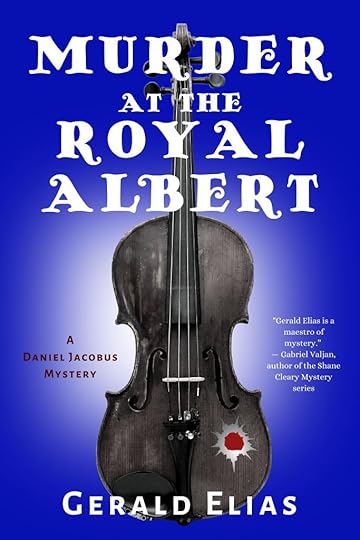
January 10: The release of Coolest American Stories 2023. My story, “A Scarab for Normandy,” was among 13 selected for one of the year’s most popular anthologies.

February 8: The release of It’s a Crime!, which, in its 1st week, was Amazon’s #12 bestselling hot new release for Kindle New Mystery Anthologies!
March 11: I’m joining three other prominent Western authors as an online panelist for Murder at High Noon, part of a 2-day Zoom conference of writers and readers called Murderous March. Sponsored by the Upper Hudson Chapter of Sisters in Crime, the “Mavens of Mayhem,” there are a whole slew of user-friendly events. As you can guess from the name of my panel, we’ll be conversing about Western mysteries, including my own Roundtree Days. Register now!
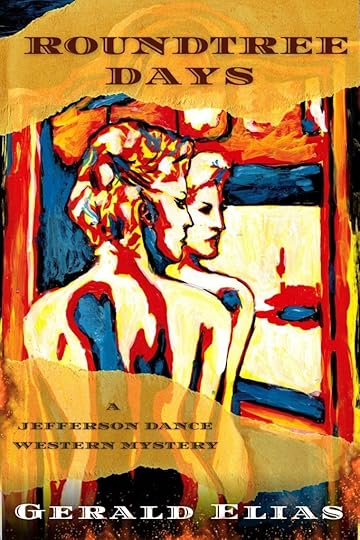
March 14: My short story, “Last Night,” about the race against a catastrophic pandemic, is featured as the first story in the wickedly clever Crimeucopia issue, One More Thing to Worry About, a Murderous Ink Press Anthology.

March 22: I’m partnering with author Scott Graham in a lively discussion of our Western mysteries, again with my Roundtree Days and Scott’s Saguaro Sanction, in an online event sponsored by The King’s English Bookshop.
HERE’S THE QUIZ YOU'VE BEEN WAITING FOR!If you're one of the first five responders who email me the correct answer, you'll win your choice of any of my eBooks. What's the catch to all this, you may ask? Only this: If and when you finish reading one of my books, please consider writing a customer review on Amazon. It makes a world of difference when prospective readers can see what others think about my books. No obligations, just a friendly request. Thanks for considering.OK, here's the quiz question: What is the full married name of Yumi Shinagawa’s grandmother?That’s about it for now. Have a lovely spring and see you again in the summer. Happy Reading!
gerald elias man of mystery.wordpress.com/
Happy Reading!
gerald elias man of mystery.wordpress.com/
February 15, 2023
The Burden of the Backlist
I consider myself extremely fortunate. I’ve just released a self-published collection of 30 short mysteries entitled IT’S A CRIME! I’ve written a mystery series of eight books featuring the iconoclastic sleuth, Daniel Jacobus; two stand-alone mysteries, ROUNDTREE DAYS and THE BEETHOVEN SEQUENCE; a musical memoir called SYMPHONIES & SCORPIONS; a children’s book, MAESTRO, THE POTBELLIED PIG; and many more published short stories and essays. And all that in 14 years. I’m probably leaving some things out. Oh, yes. I have another collection of short stories featuring a very empathetic protagonist, a retired NYPD Police Chief named Maury Gross. The name of the collection is MURDER ON VACATION, and I’m in search of a publisher. Let me know if you’d like to be it. They’re terrific stories, if I do say so myself.
So, what’s troubling me? I’ll tell you. It’s that with all these books, I now spend more time trying to promote (i.e. sell) them than I do writing. Email blasts, Facebook posts, Instagram photos, Amazon promotions, attending Zoom meetings of author organizations, doing events at bookstores, meeting with book clubs – that’s what I do.
But when I speak to other authors, I realize I’ve just scratched the surface. There’s so much more that can be done. In just the past few days, one author told me how she is able to get customers to buy books directly from her website. Another author told me “how easy it is” to create audiobooks on Audible without having to pay any upfront money. But, isn’t it true that there are still only 24 hours in the day?
In the old days, or so I’m told, the publisher was the driving force in the marketing of its books, but these ain’t the old days. These days, authors need to be social media experts to make a living. Try as I might, I haven’t developed the knack, perhaps because I really don’t like it. Thank God, I don’t have to rely on book sales to get by, because royalties and 50¢ (okay, $3.00) will get you a cup of coffee.
Maybe it’s that I still have one foot in the 20th century. Maybe it’s that I’m 70. Or maybe it’s that I’ve just run out of good ideas, because it’s getting harder and harder to start – let alone finish – anything new. On the other hand, I know from speaking with authors who write better than I do how hard and frustrating it is for them to even get through the door to get one book published. Every once in a while, I’ll read one of my earlier books, come across a line I had forgotten I had written, and think, “Hey, that’s pretty good.” So, I can’t complain…but I guess I just did.

November 28, 2022
“Killing the Conductor” and a lot more.
It has been a long time since my last blog post.
It’s not because I’ve been lazy. Au contraire! Things have been a real juggling act with music and writing projects. For example, this week I’m going to Salt Lake City to conduct the 40th anniversary Vivaldi by Candlelight concerts, which has been a year-long project in preparation. In addition, I gave my first recital in Seattle a month ago, and my first recital on a Baroque violin. The program included sonatas by Pietro Castrucci, a long-neglected Baroque virtuoso, and whose Opus 1 sonatas had never been completely recorded until Centaur Records released my recording of them last spring, gaining glowing plaudits from The Strad, Early Music America, and American Record Guide.
Back in September I also had the honor of having two of my chamber ensemble compositions––”Conversations With Essie” and “The Legend of William Grandstaff”–– performed at the 30th anniversary of the Moab Music Festival in Utah.
And, since this time last year I’ve had two mysteries published––CLOUDY WITH A CHANCE OF MURDER and ROUNDTREE DAYS, with a third, MURDER AT THE ROYAL ALBERT, due for a January 1, 2023 release. (Let’s hope that ROYAL ALBERT gets as glowing a review as the two previous mysteries!) To top things off, my short story, “A SCARAB FOR NORMANDY,” was selected for publication in the upcoming prestigious anthology, COOLEST AMERICAN STORIES 2023.
Most of all, though, it has been a great pleasure to be living in Seattle in order to be a hands-on grandparent to my two lovely, hilarious, and active little grandchildren, which has been the most fun and most exhausting endeavor of all. Many of you understand what I’m talking about.
So, you see, I haven’t been vegging by any means. And although I may have neglected my own blog, I recently had a guest post called “KILLING THE CONDUCTOR” featured in Janet Rudolph’s MYSTERY FANFARE, all about the motivation and inspiration for the Daniel Jacobus mystery series. I hope you’ll enjoy reading it.
Have a wonderful holiday season. And, please, don’t stay too busy!

July 13, 2022
An Accidental Western Hero
My wife and I are big fans of the Longmire television series and the books, by Craig Johnson, upon which they’re based. The stories are always engaging, entertaining, and provide a colorfully perceptive view of contemporary Western life. I’ve always enjoyed Westerns, going back to when I was a little kid and was taken back “into the thrilling days of yesteryear” by the Lone Ranger. I’ve also always enjoyed mysteries, starting with the Hardy Boys and Nancy Drew, that occupied my time when I wasn’t watching Westerns.
So, a few years ago, when we were doing a cross-country drive from Seattle to Massachusetts for the summer, we decided to take a slight detour off of I-90, setting our sights on Buffalo, Wyoming, home to Sheriff Walt Longmire and Co. And since it was morning, why not have breakfast at the Busy Bee, a real-life café and their frequent TV hangout?
We pulled into town, expecting to find a drowsy, off-the-beaten track, typical Western village (if there is even still such a thing). Boy, were we surprised! Buffalo was packed to the gills. We couldn’t find a parking spot for a half mile within “downtown.”
What gives? we wondered. Wouldn’t you know, it was the annual Longmire Days weekend, and the town was flooded with tourists. Most of them looked 70+ ––it seems Longmire is much more popular among the senior set. Every store seemed to be selling Longmire paraphernalia, from hats to spurs (and books, of course). Flyers listed the nonstop schedule of all the Longmire activities that were taking place over the weekend.
We did manage to find a seat at the Busy Bee among a sea of white hair, sharing a table with some seniors who had driven up from Colorado and were drooling as much over the prospect of catching a glimpse of the celebrity actors as they were over their pancakes. Breakfast was pretty good, once we got it.
What struck me the most about the whole surreal experience was the almost fanatical adoration of Walt Longmire. It seemed that these folks almost thought he was a real person and not simply a fictional character. That’s when my light bulb went off!
What if, I thought, a real murder were to take place in a small Western town during one of these festival weekends, and the townspeople expected the TV sheriff to solve it while giving the real law enforcement short shrift? Lo and behold, that’s how a new Western hero, Jefferson Dance, was born. “Pleased to meet you, ma’am.”
My full-length novel, Roundtree Days, will be released in August 2022. It is set in the fictional Utah desert town of Loomis City, where all kinds of mayhem will take place. I don’t want to give any of it away. In the meantime, I’ve written five Jefferson Dance short mysteries that I’m rolling, out one per week, for your reading pleasure. So, for the moment, please enjoy “Oh, Give Me a Home,” and be sure to have a nice day now.
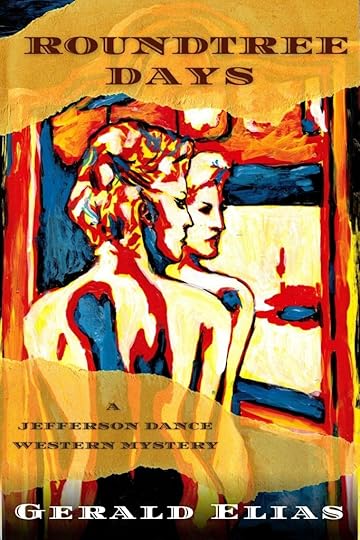
March 12, 2022
BURIED TREASURE
Go to England or Israel with a shovel and start digging, and pretty soon you’re likely to unearth a bit of history or prehistory. Chances are it will be a mere bauble or broken potsherd, but if you’re lucky you’ll strike it rich, discovering an entire Roman mosaic or an Old Testament scroll.
I’ve been that lucky, because the same, in a sense, is true for Baroque music repertoire. Even with the hundreds of composers we know of and their thousands of compositions, we’ve hardly scratched the surface. Less than a hundred years ago, for example, the gold mine named Antonio Vivaldi was virtually unknown. And the more we dig, the more we uncover. It’s as if the reservoirs of music are as unlimited as the earth’s vast stores of oil, and are much more environmentally friendly.
Several years ago, I was researching repertoire for the annual Vivaldi by Candlelight chamber orchestra concert that I conduct, seeking “new” music by tapping into that bottomless reserve of Baroque repertoire. I stumbled across a composer I’d never heard of, Pietro Castrucci. A YouTube performance of six concerti grossi he had composed immediately grabbed my attention: They were dramatic, expressive, dynamic, and most impressively, his was a unique voice, distinct from his more illustrious contemporaries, Handel, Corelli, Vivaldi, and Bach.
I immediately added his music on the program. But, in addition, as a violinist I’m always trying to expand my own repertoire to perform in recital. I was delighted to discover that Castrucci also composed 12 violin sonatas as his opus 1. To my chagrin, I was not only unable to find a recording of more than one or two of them (though a few had been transcribed for flute), the only print edition of his sonatas was the original one from 1718!
The more I learned about Castrucci, the more I felt a kinship. His music will never see the kind of revival that Vivaldi’s had, not that it is in any way inferior, but because he composed so little of it. And the reason? He had a day job. In 1715, he and his brother Prospero were recruited to go to London from their homes in Italy in order to become the concertmaster and principal second violinist, respectively, of an opera company orchestra that had been created expressly for Handel. Pietro remained in that position for twenty years, and in that period he only had time to compose two sets of violin sonatas and the one set of twelve concerti grossi referenced above. As a full-time orchestra player myself for 36 years–and for most of that time an associate concertmaster–I felt like I knew this guy: practicing new repertoire every week, going to endless rehearsals, late night performances, and fitting in recitals and compositions when time (and energy) permitted.
If I ever needed a mission in life, I now had one. This man’s music needed to be heard. To make a long story very, very short, I’ve made the first recording in history of the entire opus 1 by Pietro Castrucci, in collaboration with harpsichordist Pamela Palmer-Jones and cellist Noriko Kishi. These sonatas are fantastic, traversing as wide an expressive spectrum as one could hope for, from darkly turbulent to light-as-a-feather charming. The 18th-century music historian, Charles Burney wrote, “[Castrucci] was long thought insane…his compositions were too mad for his own age.” They might not seem as insane to us today, but they remain as fresh distinctive as on the day they were composed. The recording will be released by Centaur Records on April 1.
To “launch” the recording, my colleagues and I are presenting a free lecture and performance at the University of Utah School of Music on Friday, April 22. If you can make it, you’ll experience buried treasure that’s been hidden for 300 years.
 Pietro Castrucci (1679-1752)
Pietro Castrucci (1679-1752)
March 3, 2022
PASSED BALL: MLB RIP
Why Does No One Give a Damn About Major League Baseball Anymore? Let Me Count The Ways.
Back in the day:
There was no pitch count.
There was no metadata.
There was no designated hitter.
There was no automatic walk.
There was no instant replay.
There was no strike zone graphic.
There was no radar gun.
There was no slow motion replay.
There was no Jumbotron.
There were no agents or free agents.
There were no batting gloves.
There were no new baseballs for every pitch.
There was no umpire video review.
There were no multi-million dollar players.
There was no home-run bat toss.
There was no pointing towards heaven for a two-out walk.
There was no infield shift.
There was no bench coach.
There were no six-inning, “value” starts.
There were no relief pitchers every inning.
They didn’t celebrate walk-off singles.
There were no strikes or lockouts.
On the other hand:
There were day games.
There were affordable tickets.
There were doubleheaders (Sunday, Lady’s Day, Labor Day, Twi-night).
There was playing for a run.
There was hit and run.
There were sacrifice bunts.
There were bunts for base hits.
There were squeeze plays.
There was hitting behind the runner.
There were players with nicknames like Lefty, Whitey, and Moose.
There were media photographers on the field.
There were players, including stars, drafted into the armed forces.
There were players who owned hardware stores to make ends meet in the offseason.
There were arguments with umpires and civility in the stands.
There was Robert Merrill singing the national anthem.
There was real organ music.
There was high-and-tight: brushback, not retaliation.
There were stolen bases.
There were double steals.
There was something in between hitting homeruns and striking out.
There was a World Series in October.
There was an Old Timers game.
The closer came in when the starter got in a jam, not in the 9th inning when the score was 5-2.
There were complete games.
There were knuckleball pitchers.
There were teams, not individual players.
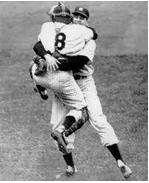 When baseball was baseball.
When baseball was baseball.
November 2, 2021
Final Farewell to Our Tree
Its bark was thick and tough and as creased as the skin of a wise old African elephant. Its triple trunks had towered over the little house long before I was born, probably before my great grandfather was born.
But, like every other ash tree, it was not immune to the vicissitudes of time or the relentless tenacity of the tiny emerald ash borer. Little by little, over the years, we therapeutically pruned the dying limbs, twenty feet off the ground, thirty feet, forty feet, until all that was left, other than dying branches, was the tree’s canopy that cast shadows over half the lawn. Sometimes, when limbs gave up on their own, we didn’t need to prune. They would just snap off under their own dead half-ton weight and thud to ground, shaking the earth like a dinosaur’s footfall.

Now, for its curtain call, its leaves were falling in its final autumn. It had been determined and reconfirmed by more than one consultant that the tree’s inevitable death spiral had made it dangerous, that a massive limb or one of its three main trunks could split off and fall on our deck, on our roof, on us. No more pruning would save it. It was on life support and it was time to pull the plug.
It was time to cut it down. Time to cut down the tree that had provided our kids with a sturdy arm for their rope swing thirty years ago, that had provided us cooling shade in the hot, humid Berkshire summers and golden foliage in autumn, that had been home to countless birds, squirrels, and less friendly occupants, that had been the majestic centerpiece of our yard from the day we moved in over forty years ago.
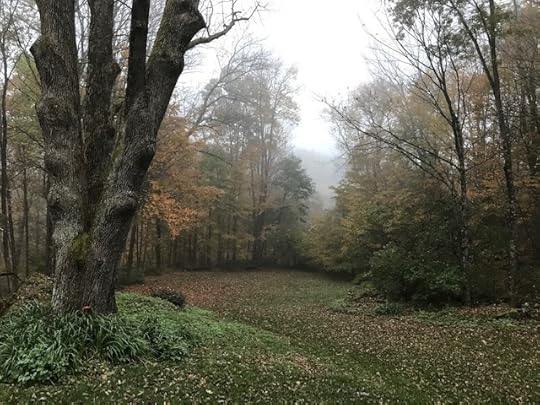
I sat on the deck, peering way up to where a couple decades ago we had a tree guy cable the three trunks together to prevent the tripartite base from splitting in strong winds. How many thousands of dollars we had spent caring for that tree, all of it worth every penny. Now, some of it would be cut up into firewood to burn in our woodstove to keep us warm in winter, some more of it would be chipped into mulch to keep our vegetable garden tidy, and the rest would be hauled away.
I sat on the deck, communing with the tree for the last time. The tree guy would be here soon with his crew to cut it down, and I didn’t want to be around to watch. I felt guilty.
The tree climber with his spiked shoes, ropes, and chain saw would clamber up the tree and start lopping off limbs from the top down. When they landed, most of it would be shoved into the chipper and blown into the back of the truck. Little by little, the tree would be whittled down until nothing was left but its massive stump, four feet in diameter. Before nature takes over and the stump itself slowly but surely begins to rot I’ll count the rings in honor and in memory of its time on earth. Regardless, in another generation, no one will know this magnificent tree ever existed except for photos and stories.
As I looked up in at the tree for the last time, a breeze stirred the tree’s upper limbs, as if saying goodbye. I know it’s my imagination, but I think it knew.
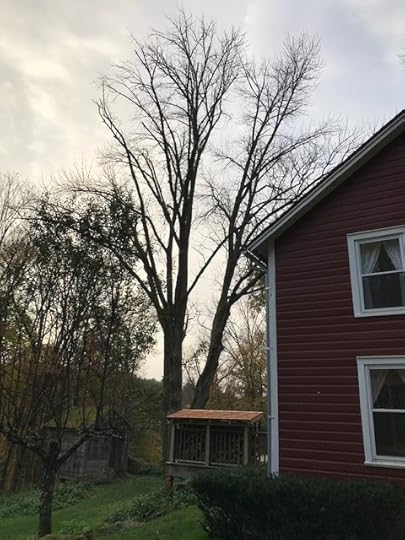
October 11, 2021
Death and the Conjunction
Many people who are only mildly familiar with Schubert’s famous lied and the equally magnificent quartet after which it is named often mistakenly refer to the title as “Death of the Maiden.” The correct name is “Death and the Maiden,” and that one little difference makes all the difference in the world.
First off, with the use of the preposition “of,” the meaning of Death would suggest that the maiden is in the process dying. In fact, in the two-stanza song, Death is not a mere condition. Death is as much a three-dimensional character as the Maiden, singing the entire second stanza, while the Maiden sings the first.
Secondly, and perhaps more important, by thinking of the title with the “of” instead of the “and,” one would assume that the Maiden dies, when in reality no such things happens. Rather, there is an argument: the Maiden insists she is too young to die, whereas, in response, Death gently beckons her to take his hand. What makes Schubert’s song so powerful is that it ends with no resolution. What happens to the Maiden? One can hazard a guess, but one can’t be sure.
Why does this absence of resolution make it more powerful? Because it inevitably leads to the question that Schubert forces every serious listener of “Death and the Maiden” to ponder, a question that will eventually affect everybody: When Death comes to my doorstep, am I going to gracefully bow to the inevitable or will I struggle mightily until my last breath? Will I reach out and calmly accept Death’s outstretched hand, or am I going to spurn his invitation until the bitter end.
This is the question at the core of my Daniel Jacobus mystery, Death and the Maiden. Many of the characters in the book are forced to confront the issue; some have time to consider it philosophically, others are not given the luxury and are cut down before they know it. The “Maiden” in the story is Jacobus’s protégée, the concert violinist Yumi Shinagawa. Jacobus asks her that question theoretically at a violin lesson, but it is only when the situation is all too real that she finds her answer.
I hope you’ll enjoy reading Death and the Maiden. But by all means, listen to Schubert’s heart-churning lied and his dramatically riveting string quartet.
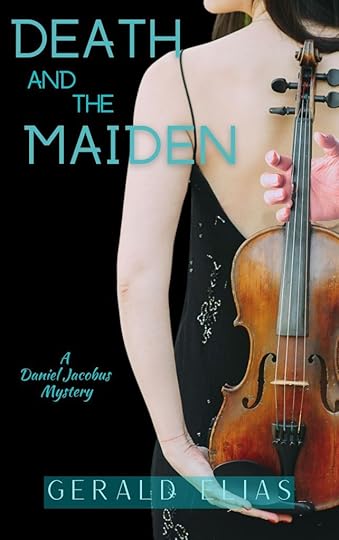
August 23, 2021
On Demagoguery
About a week ago, Dr. Angela Dunn, the state epidemiologist of Utah, recommended a facemask mandate for public schools. Outraged, the Salt Lake County Council met in emergency session and overrode the recommendation, prohibiting schools within their constituency from requiring masks.
Many parents were appalled, but, seemingly, just as many others were jubilant, celebrating the Council’s decision as a defense of their individual rights, and accusing Dr. Dunn of playing politics with their children, of “demagoguery.”
I just want to say a few words in response the accusation of demagoguery when it comes to a mask mandate. Okay, more than a few.
When I was a kid, there were no seatbelt laws. Mothers sat in the front seat holding their children in their laps. Picture the carnage. Seatbelt laws were passed. Some said that we were being deprived of our rights, that it was demagoguery.
When I was a kid, there was a “proud” American tradition of people throwing trash out their car windows, everything from cans to bottles to paper wrappers. Our highways and back roads looked like garbage dumps. Littering laws were passed. Some said that the fines were onerous, that it was demagoguery.
When I was a kid, there were no pooper scooper laws. Imagine what that looked like, especially if you stepped in it. (Yicch) Laws were passed. Some said it was unenforceable, that it was demagoguery.
When I was a kid, there were no clean water laws. As the ultimate embarrassment, an oil slick on the Cuyahoga River in Cleveland caught on fire. The environmental movement was born. Laws were passed. Some said that it was anti-manufacturing, that it was demagoguery.
When I was a kid, there were no clean air laws. The air over Pittsburgh cloaked in noxious black smog, and acid rain from Ohio industrial plants blew eastward and killed every living animal in innumerable New England lakes. Laws were passed. Some said it was anti-industry, that it was demagoguery.
All of these laws and regulations we now view as common-sense public policy that keeps our society safe and comfortable. We hardly give them a second thought. But, if you don’t like one or it’s not working well, you have choices. You can lobby your elected representatives to change it, or you can vote for different representatives. That’s what elections are for. It’s the way the process of policy change in our democracy was intended to work. There is nothing innately heinous about a policy you don’t like.
When Dr. Dunn recommended the mandate, supported by school districts, that children wear facemasks to school, it was in order to keep children, and the teachers, and their families safe from a deadly pandemic, and in order to bring as swift an end as possible to this pandemic—which has been extended unnecessarily by an ill-advised ideological false narrative—with the least intrusive, most effective way possible. And some have mistakenly called this prudent public health policy demagoguery. Please don’t be fooled.




